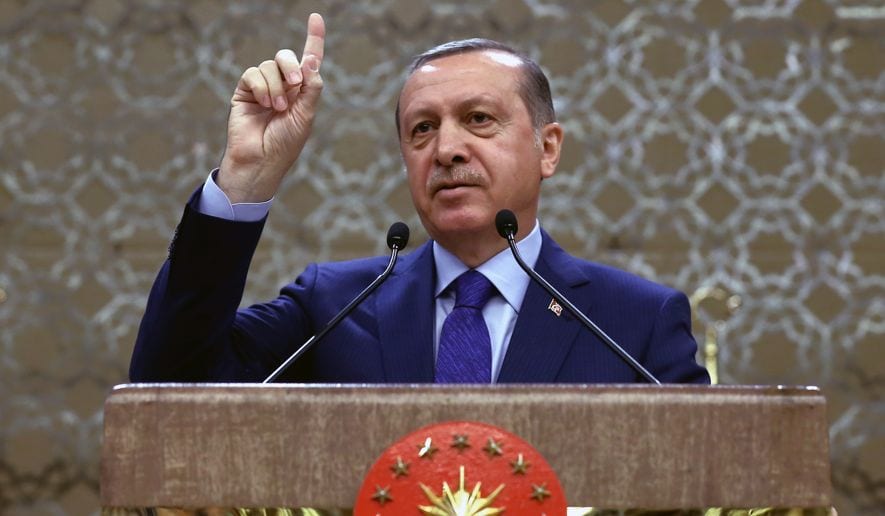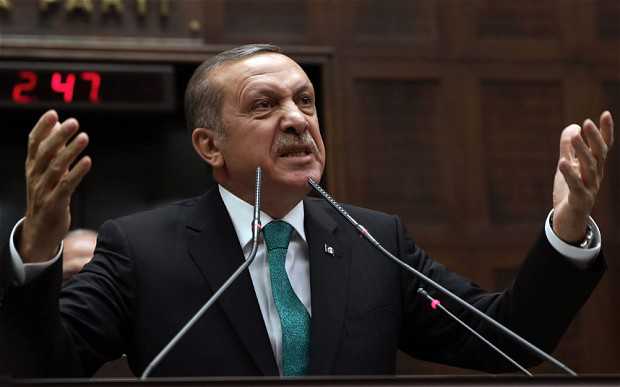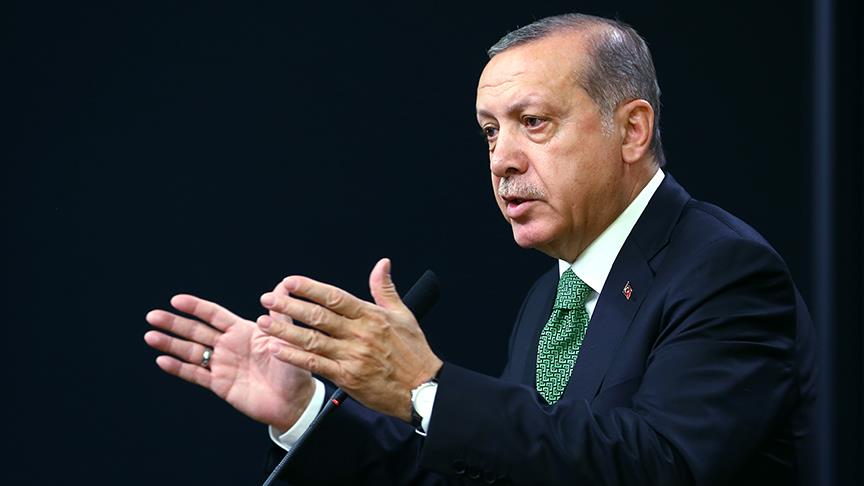Turkish voters go to the polls Sunday in the culmination of an acrimonious election campaign pitting a fractious opposition against the long-dominant ruling party and the country’s most divisive figure: President Recep Tayyip Erdogan.
The parliamentary vote, analysts say, could determine whether this dynamic nation of 80 million fortifies its vibrant democracy or slides further toward autocratic rule dominated by Erdogan, a charismatic leader who inspires fierce loyalty among supporters and revulsion from critics.
The president has called on the electorate to give his ruling Justice and Development party a supermajority in the parliament, which would facilitate constitutional changes bolstering his power as president.
Turkish President Recep Tayyip Erdogan greets supporters in Eskisehir, Turkey, on June 5, 2015.
(Kayhan Ozer / Presidential Press Office)
However, polls have suggested that the party will garner 42% to 45% of the vote, which would be a significant reversal of fortune from the nearly 50% it took in the 2011 general election. A recent economic slowdown and increase in unemployment have unnerved many voters.
The election has been marred by violence, as tension and polarization sweep Turkey. On Friday, an explosion at a final rally of the People’s Democratic Party killed two supporters and wounded 100 in southeastern Diyarbakir, according to local news accounts.
The prospect of diminished support for Erdogan has raised hope among opposition blocs, including the upstart Peoples’ Democratic Party, or HDP, which has endeavored to expand its base beyond the nation’s Kurdish minority. The left-wing party aims to capture the votes of liberals who have grown disillusioned with both Erdogan and traditional parties, such as the center-left Republican People’s Party, the main opposition bloc.
“We have to make a new start by putting people at the heart of the system,” Selahattin Demirtas, HDP leader and human rights lawyer, said in April.
lRelated
Pope Francis’ Armenian genocide remarks prompt strong response
Europe
Pope Francis’ Armenian genocide remarks prompt strong response
See all related
8
Erdogan has demanded for months that his support base deliver a resounding victory for the conservative ruling party with Islamist roots. The party has ruled Turkey since 2002, presiding over a period of rapid economic expansion that also saw Erdogan increase the profile of Islam in a republic long torn between Islamic roots and secular present.
If the party can secure at least 330 seats in Turkey’s 550-seat parliament, critics say, Erdogan can rewrite the constitution and hasten the nation’s move toward authoritarian rule. A supermajority of 367 seats would allow the president to make the change without a referendum.
“He is establishing a system of personal rule,” said Ergun Ozbudun of Istanbul Sehir University, a leading constitutional law scholar. “What he desires is nothing like the U.S. system, as he does not care for checks and balances…. It is a system which we can no longer call democratic.”
But the president’s defenders deny any drift toward one-man, one-party rule and note that the Erdogan years have brought unprecedented prosperity to Turkey. Erdogan himself says the constitutional changes would spur growth and Turkey’s ascension as a global power.
“Erdogan is like the conductor of an orchestra,” said Mustafa Yildiz, 64, a civil servant and supporter strolling recently outside Ankara’s Kocatepe mosque. “The presidential system will create harmony in Turkish politics.”
Erdogan has bristled during mass rallies, assailing opposition movements as part of “the Armenian lobby, homosexuals … representatives of sedition.” He has repeatedly rejected allegations that Ottoman-era Turkey committed a genocide against the nation’s Armenian minority a century ago.
cComments
Orientals are different. An autocrat with quirks and bad manners is frequently perceived as the projection of one’s own strength, which actually doesn’t exist. More prosperity causes more secularization, which could allow Turkey to move from an oligarchy (CHP) via an autocracy (AKP)…
jgttgns
at 10:07 PM June 05, 2015
Add a comment See all comments
2
Erdogan’s bellicose campaign rhetoric has outraged opposition leaders, who note that the constitution requires the president be nonpartisan and above party politics. Erdogan stepped down last year as party leader to run for president, receiving 52% of the vote. But he has hardly remained above the partisan fray.
“Erdogan is not a president who could stay passive,” noted Huseyin Bagci, head of International Relations at Middle East Technical University in Ankara. “The problem for him is the constitution is not ‘his’ constitution.”
Intimidation of critical journalists, now commonplace under Erdogan, has increased.
Most recently, Erdogan demanded a life sentence for the editor of the daily newspaper Cumhuriyet, Can Dundar, for publishing images of a shipment of heavy weapons to Syrian Islamist rebels on trucks belonging to the Erdogan-controlled National Intelligence Organization, or MiT, in January 2014. The weapons were hidden below medical supplies, the newspaper reported.
Erdogan’s foreign policy, particularly support for Syrian rebels, is deeply unpopular among many Turks. Turkey’s more-than-500-mile border with Syria has functioned as a rebel resupply and logistics zone.
In this election, Prime Minister Ahmet Davutoglu, an Erdogan loyalist, was supposed to be the public face of the ruling party. Posters of the bespectacled Davutoglu are everywhere. But he lacks Erdogan’s charisma, so the president has hit the campaign trail with gusto, counting on his cult of personality to bring in votes.
The two men regularly attend “opening ceremonies” together, where they appeal to the grandiose ambitions of their conservative Sunni Muslim support base.
“By God’s will, Jerusalem belongs to the Kurds, the Turks, the Arabs and to all Muslims,” Davutolgu reportedly said during the recent inauguration of a new airport in southeastern Turkey.
But Erdogan’s march toward a more powerful presidency could be thwarted if the HDP manages to capture more than 10% of the vote, the threshold needed to enter the parliament. That would give the group a substantial bloc.
The left-wing party, founded in 2012, has run an upbeat campaign. Half of the HDP’s candidates are women, and religious figures and gay candidates are also in the ballots.
“I like their speeches, that they don’t discriminate against anyone,” said 40-year-old Emine Tunc, sitting in a billiard hall in the predominantly Kurdish Istanbul neighborhood of Tarlabasi, speaking of the HDP. The ruling party “will help the Syrians, but when it comes to us, they do nothing.”
The HDP strategy is a gamble, however. If the Kurdish-linked bloc’s vote drops below that watershed mark, the Justice and Development Party probably will absorb most of those votes and move closer to securing the large majority it needs to push through constitutional changes.
Erdogan has pursued a peace bid with the country’s Kurds, strengthening Kurdish rights after decades of insurgency that cost of tens of thousands of lives.
However, as Islamic State militants last year laid siege to the ethnic Kurdish city of Kobani, Erdogan refused to support the defenders of the Syrian border city. The policy alienated the nation’s Kurdish minority and sparked riots.
Appealing to more religiously austere Kurdish voters, Erdogan brandishes Kurdish-language Korans at rallies in an attempt to arrest resurgent Kurdish nationalism.
“I hope my conservative Kurdish brothers can realize Erdogan is just using religion as a tool to get more power,” said Sedat Ocal, a 29-year-old Kurdish man who hawks cheap jeans from a shop in Eminonu, a suburb on the fringes of Istanbul’s iconic Bosporus Strait.
Yet to his supporters, Erdogan can do little wrong.
Standing in his spice store in Istanbul’s conservative Fatih district’s Egyptian market — a ruling party stronghold — Savas Cinar, his beard fashioned in the style favored by Erdogan’s pious supporters, rattles off a list of the party’s achievements, including giant construction projects and the rescinding of a government ban on women wearing Muslim head scarves at universities and government offices.
“Before Erdogan, we Muslims had no life,” Cinar said. “Soldiers used to come to our Koran recitals and harass us. Now we are a global power.”
Special correspondent Johnson reported from Istanbul and Times staff writer McDonnell from Beirut.
Twitter: @mcdneville







